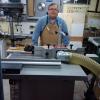Hello,
I have three single-phase 240 volt machines that are equipped with twist-lock plugs, but only two wall receptacles. Is it possible to properly rig up a wooden box with two twist-lock receptacles in it so I can leave two of the machines plugged in to the box at all times, the cord running from the box plugged into the wall receptacle, and then use a switch mounted on the box to select either one tool or the other?
I don't want to risk damaging any of the tools, but I do not have the mobility I used to, and it's really hard for me to access the wall receptacle to change the machine that is plugged in there.
Thanks,
Joe H.




 Reply With Quote
Reply With Quote

 But just a power strip / splitter with 240v plugs+receptacles on it.
But just a power strip / splitter with 240v plugs+receptacles on it.







